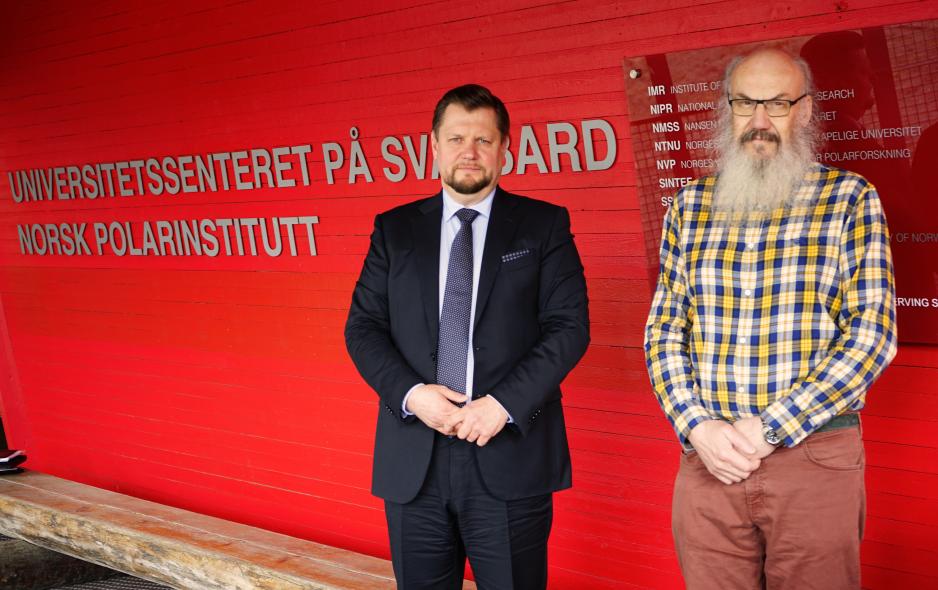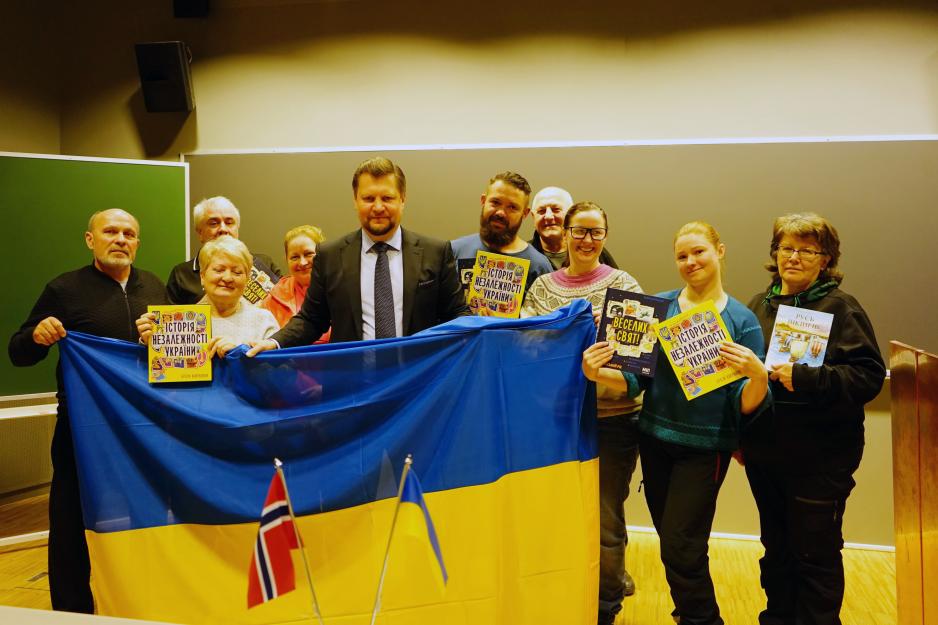Now Ukraine Looks Towards the Arctic, Too

Ukrainian Ambassador to Norway Vyatsheslav Jatiuk (left) visiting the Norwegian Polar Institute at Svalbard. Here pictured with the Institute’s International Director Kim Holmén. (Photo: Ukrainian Embassy to Norway)
Norway and the Ukraine are approaching each other politically, economically as well as culturally, says the Ukrainian Ambassador to Norway Vyatsheslav Jatiuk. The Ukraine now wants to cooperate about specific projects in the Arctic, and the Ukrainian ambassador recently visited Svalbard.
When Ukrainian ambassador Vyatsheslav Jatiuk descended from the plane in Longyearbyen on 12 June, it marked a historic event in the history of Norwegian-Ukrainian political relations. For the first time ever, a sitting Ukrainian ambassador visited the archipelago which is at present home to more than 400 Ukrainian citizens.
However, the ambassador also brought with him a clear goal about more Arctic cooperation with Norway.
- The Ukraine is at present not engaged in Arctic-related activities. However, we have started thinking about the Ukraine as an actor in the Arctic. My visit had two purposes; to confirm Ukraine’s desire to cooperate more about Arctic issues, and to visit some of the Ukrainian citizens living and working on Svalbard, says Jatiuk.

The Ukrainian ambassador also met with some of the more than 400 Ukrainian citizens living and working on Svalbard today. (Photo: Courtesy of the Ukrainian embassy)
Many Ukrainian citizens
On Svalbard, the Ambassador met with both science and official authorities, such as the Norwegian Polar Institute, the University, the Local Governor and the local administration, Svalbard satellite station and the Ny Ålesund station.
Jatiuk also visited the site of the Opera Mountain accident in 1996, where 141 people died. Most of the dead in the plane crash were Russian and Ukrainian miners heading from Moscow to the islands.
Jatiuk argues that the Ukraine can strengthen its ties to Norway in particular when it comes to the fields of climate change research and satellite technology. Although the Ukrainian presence in the Arctic today does not stretch beyond a large amount of miners in Barentsburg, the country is present in Antarctica through the Vernadskiy research base.
- Some of our interest in Svalbard is related to the fact that many Ukrainian citizens reside there. Most of them work for the Russian mining corporation Arktikugol in Barentsburg, yet there are also 40 Ukrainians in Longyearbyen. I met well-integrated inhabitants who actively participate in their local community, however, we are always interested in having good communications with our citizens and being able to protect them if and when need be, says Jatiuk.
During the Arctic Council meeting in Rovaniemi, Finland last May, US Secretary of State Mike Pompeo lashed out against both Russia and China – countries that, the USA claims, do not play honestly in the Arctic.
- There are only Arctic and non-Arctic states. There is no third category. And claiming something else gives China exactly zero rights, Pompeo said.
The USA is also planning to expand its military presence in the Arctic over the coming years, a move that may contribute to increasing tensions.
Ambassador Jatiuk responds like this when asked what it takes to keep the Arctic a peaceful place in an increasingly tense world:
- We need to maintain our focus on international cooperation in the Arctic. The more nations involved in polar activities through established institutions, the harder it will be for states with less noble goal to realize these. There are several institutions, both global and regional, where cooperation in the Arctic can be discussed and developed. And both the Ukraine and Norway are committed to the principles laid down through the UN for peaceful cooperation in the Arctic, Jatiuk says and adds:
- I hope we can enter into several bi-lateral partnerships with Norway about cooperation in the Arctic in the near future.
Little, but increasing trade
The Ambassador describes the Norwegian-Ukrainian relationship as one of the most dynamic ones in Europe today. For the past three years, there have been a series of meetings on political top level between the two countries, amongst others the Ukrainian presidential visit in 2016 and the prime minister’s visit to Norway earlier this year.
Last fall, a barrier was broken when Norwegian Trade, Industry and Fisheries Minister Torbjørn Røe Isaksen visited the Ukraine as the first such Norwegian minister ever to do so.
Even though trade between Norway and the Ukraine only amounted to NOK 2.1 billion last year (appr. € 200 million), this represents a 100 percent increase over three years, Jatsiuk points out. The increase over the past few years indicates that the bilateral ties between the Ukraine and Norway are strengthening, even though the level is NOK 500 million lower than in 2012, the Ambassador argues.
- Over the past years, Norway and the Ukraine have strengthened their bilateral ties both when it comes to politics, but also in economics and humanitarian assistance. We appreciated Norway’s strong support in favor of Ukrainian territorial integrity and independence. We experience increased mutual interest in investment and trade. Even if the starting point was low, trade between the two countries is growing fast, which demonstrates a potential for further increase, says Jatsiuk.
A new initiative aims to bring Norwegian and Ukrainian researchers and archeologists together to study the joint Norwegian-Ukrainian history going back more than a millennium in time. Back then, the current Ukraine was the seat of the Kiev kingdom, founded by Norwegian Vikings in the 9th century.
The Ambassador also points out that neither of the two countries is member of the EU and thus has much to learn from one another in order to succeed with European integration.

The Ukrainian Ambassador conversing with Harald Ellingsen (right), Director of the University Centre in Svalbard. (Photo: Courtesy of the Ukrainian embassy)
- Joint challenges in Russia
Researcher Tor Bukkvoll at the Norwegian Defense Research Institute knows the Ukraine well. He argues that the “Soviet legacy” is the cause of the country’s interest in Arctic issues.
- The Ukraine is not an Arctic country, you just need to look at the map to establish that. So from that perspective, this interest may appear to be a bit of a surprise. However, the Soviet Union was active in the Arctic, and there is still some competence in that area. This is probably some of the legacy from the Soviet era. If the Ukraine had not been a part of the Soviet Union, such an interest would be less likely, Bukkvoll says.
Even though there is a long distance between the Ukraine and Norway, also politically, the countries have a joint project in relating to Russia as a neighbor, according to Bukkvoll.
- This initiative is probably also related to the Ukraine’s feeling a certain form of shared interest in the fact that we have northern ocean areas in which we cooperate with Russia. And there are challenges. There is a big difference between the Black Sea and the Barents Sea, yet there is a kind of political parallel here. Both countries have sea areas where one has to relate to Russia in the immediate proximity, even though there are major differences. Russia does for instance consider the Ukraine within its sphere of influence, whereas that is not her view on Norway, Bukkvoll says. He does not believe the Ambassador’s visit to Svalbard will raise any immediate eyebrows in Moscow.
- The visit will probably raise some interest in Moscow, however, if this involvement ends here it will not have any further consequences. Russia watches everything the Ukraine does. However, its approach to the EU and NATO will matter more than initiatives in the Arctic, Bukkvoll says.
This article was originally published in Norwegian and has been translated by HNN's Elisabeth Bergquist.

